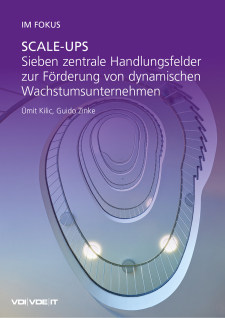
High-growth companies – so-called scale-ups – are crucial drivers of innovation, growth and economic dynamism. They typically demonstrate sustained employee and/or turnover growth of 20 % or more over a three-year period, built on scalable and profitable business models. Scale-ups usually combine strong technological expertise with industrial integration and an expanding international footprint.1 They also generate substantial spillover effects across adjacent markets, industries and innovation ecosystems.
In Germany, around 975 scale-ups can be identified with a combined annual turnover of roughly € 2 billion (as of 31 July 2025). While this represents just 4.6 % of the country’s 21,183 start-ups, scale-ups account for a disproportionate share of revenues and job creation.6 Europe-wide, the European Commission has highlighted similar dynamics.
How to strengthen your own innovation ecosystem
Promoting scale-ups is therefore a key theme if you want to further strengthen innovation ecosystems. This requires addressing key structural challenges. In addition to access to capital, suitable framework conditions, scaling support, networking, targeted innovation promotion or, better still, procurement, and organisational development are particularly important for sustainable growth beyond the mere provision of financing.
At the same time, there is a lack of capital. Added to this are a shortage of skilled workers, limited ecosystem functionalities and more support tailored to scale-ups, including appropriate monitoring, policy advice and control mechanisms. Furthermore, there is no uniform definition of scale-ups, at least not at European level.
In this publication, the team of authors takes a more detailed look at the (initial) most pressing requirements for action based on the current debate and relevant research.

